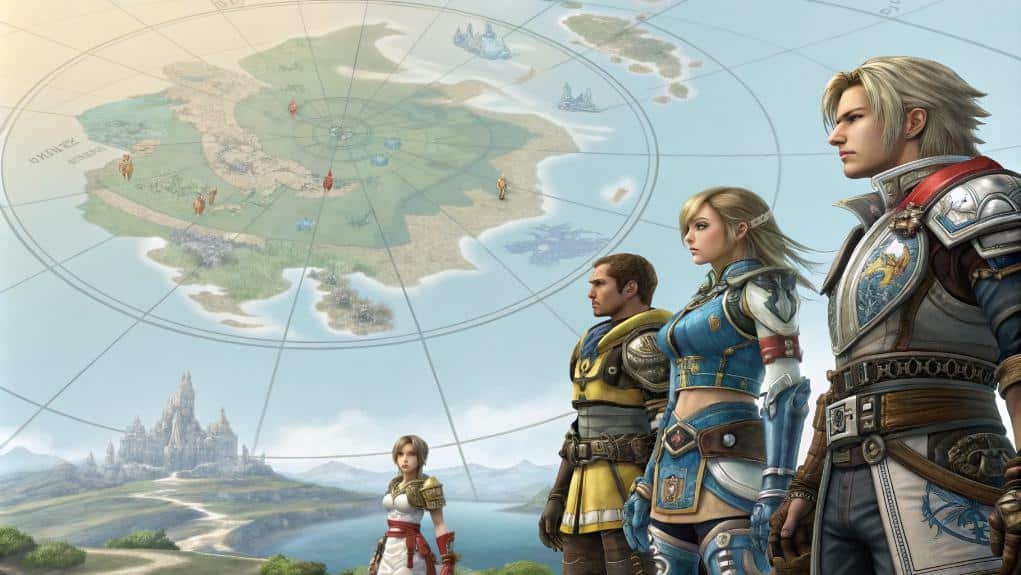Final Fantasy XII emerged from a lengthy development period starting in 2000, transforming the franchise with its innovative gameplay systems, such as the Active Dimension Battle System and Gambit System. Released in Japan in 2006, it showcased a new narrative style and character-driven leadership dynamics, influencing player engagement. The game initially faced mixed critical reception, but over time it garnered recognition as a groundbreaking RPG, earning awards for its story and character design. Its legacy endures, impacting future titles in the franchise and redefining player expectations in RPG design. Exploring its evolution reveals much more about its enduring impact.
Key Takeaways
- Development of Final Fantasy XII began in December 2000, with a launch on March 16, 2006, for PlayStation 2 in Japan.
- The game introduced innovative gameplay mechanics, such as the Active Dimension Battle System and Gambit System for customizable AI.
- The Zodiac Job System allowed dual job assignments per character, enhancing strategy and character development.
- Final Fantasy XII: The Zodiac Age remaster featured improved graphics, a new soundtrack, and quality-of-life enhancements, launching on PS4 in July 2017.
- Initially met with mixed reviews, the game has since gained recognition as a pivotal RPG, influencing future titles in the franchise.
Development Beginnings

Beginning in December 2000, the development of *Final Fantasy XII* marked a significant turning point for the franchise, as it embraced both innovation and adversity. The project emerged within the context of the Ivalice Alliance and aimed to evolve the series' core concepts. Initial ideas focused on creating a seamless open world, allowing players to explore the richly crafted environment without interruptions from random encounters. This shift represented a notable concept evolution, as the developers sought to enhance immersion and gameplay fluidity.
However, the design challenges were formidable. Technical limitations of the PlayStation 2 constrained the team, forcing them to abandon features like a two-player mode and NPC recruitment for mob hunts. Despite these setbacks, the team, led by original director Yasumi Matsuno and co-directors Hiroyuki Ito and Hiroshi Minagawa, persisted in refining the battle system. They introduced the Active Dimension Battle System and the Gambit System, which featured customizable AI for characters. These innovations not only addressed the challenges but also redefined player interaction and strategy. Ultimately, the development of *Final Fantasy XII* became a demonstration of resilience and creativity amidst adversity, paving the way for future installments in the franchise. The game's setting in Ivalice's rich lore also contributed to its depth and appeal.
Leadership Changes
As *Final Fantasy XII* evolved through its development, the dynamics of leadership within the game became a pivotal element both in gameplay and narrative structure. Players can change the party leader seamlessly, whether using the D-Pad on consoles or the I and K keys on PC, enhancing the game mechanics that govern combat and strategy. This flexibility allows players to adapt their approach based on the situation—reviving fallen characters or altering tactics mid-battle. Additionally, the quick leader change feature is essential during high-stakes situations, ensuring players can maintain tactical flexibility.
The ability to switch leaders directly influences character dynamics, as each member brings unique skills and gambits to the table. While non-leaders can utilize gambits, they lack direct control, emphasizing the strategic importance of the leader. As Vaan ascends to leadership within the narrative, it mirrors the evolving relationships among characters, deepening the story's emotional impact.
Moreover, the leadership changes reflect historical shifts in the game's development, particularly Yasumi Matsuno's role adjustments. These changes shaped the final product, affecting public perception and gameplay experience.
Ultimately, the leadership mechanic adds complexity, allowing players to navigate both the tactical landscape and the rich tapestry of character interactions, ensuring that each decision resonates throughout the game.
Original Release Dates

The original release dates of *Final Fantasy XII* mark significant milestones in the game's journey, reflecting its impact across different regions and platforms. The game first launched on March 16, 2006, exclusively for the PlayStation 2 in Japan and other regions, highlighting its platform exclusivity during that era.
While these initial release dates were consistent across regions, the subsequent releases of the *International Zodiac Job System* introduced notable release differences. For instance, the Asian version hit the market on August 7, 2007, followed closely by Japan on August 9, 2007.
In 2017, the game saw a revival with *Final Fantasy XII: The Zodiac Age*, which debuted on the PS4 on July 11 in Japan and July 18 in the US and EU. This version expanded its reach to multiple platforms, including PC, Switch, and Xbox One, by April 2019. Additionally, the remaster featured a revamped job system that enhanced character development and gameplay options, making the experience more engaging for players.
Each remaster not only improved graphics but also introduced gameplay enhancements and additional features. The staggered release timeline underscores how *Final Fantasy XII* adapted to evolving gaming landscapes, ensuring its legacy remained relevant across generations.
Key Features Introduced
*Final Fantasy XII: The Zodiac Age* introduced a wealth of features that greatly enhanced the original gameplay experience, appealing to both veterans and newcomers alike. One of the standout additions was the Zodiac Job System, allowing players to assign two job classes per character. This innovation vastly expanded character builds, enabling unique job combinations that catered to diverse playstyles. Now, players could enjoy enhanced customization options that allowed for more strategic gameplay, thanks to the enhanced customization options.
Each character could now explore twelve distinct license boards, offering a greater degree of customization and strategic depth.
The game also introduced a Trial Mode, accessible from the title screen, where players could tackle 100 increasingly difficult stages. This mode not only provided an engaging challenge but also allowed players to accumulate LP points and loot that transferred to the main story, enhancing the overall experience.
In addition to these features, *The Zodiac Age* implemented quality-of-life improvements such as speed modes for faster gameplay, a transparent map overlay, automatic saving, and reduced loading times.
These enhancements, coupled with high-definition visuals and re-recorded music, created a more immersive experience, solidifying *Final Fantasy XII* as a beloved classic in the RPG genre.
International Zodiac Job System

The International Zodiac Job System markedly transformed gameplay by introducing a robust class selection and dual class assignments, allowing players to tailor their characters like never before. Initially exclusive to Japan, this edition expanded its reach through The Zodiac Age remaster, which brought the innovative job system to a global audience. This accessibility not only enhanced player engagement but also revitalized interest in the Final Fantasy series as a whole. The new system allowed for enhanced strategic gameplay through job combinations, encouraging players to experiment with their character builds.
New Job Systems
In the domain of RPGs, the introduction of the International Zodiac Job System in *Final Fantasy XII* marked a considerable evolution in character customization and gameplay strategy. This system reshaped how players approached their characters, allowing for deeper strategic gameplay through a variety of job assignments.
Key features of the International Zodiac Job System include:
- Job Selection: Players can choose from 12 distinct classes based on Zodiac signs.
- Dual Job Assignment: Each character can hold two jobs, enhancing job customization and versatility.
- Class Specializations: Each job offers unique skills, allowing for diverse character builds.
- Gambit System Integration: This system enables players to automate actions based on conditions, complementing their job strategies.
The revamped License Board also adds layers to gameplay by splitting licenses into two categories, affecting character stats and equipment choices considerably. Regular grinding is crucial to ensure characters remain competitive and can fully utilize their job capabilities.
However, players face the challenge of balancing their party composition, as job choices directly impact performance and strategy in battles.
While some criticize the system's restrictions compared to the original game's model, it undeniably enriches the experience and encourages players to explore various combinations, fostering high replay value.
Regional Availability Changes
Transforming the landscape of *Final Fantasy XII*, the introduction of the International Zodiac Job System not only enhanced gameplay but also sparked significant shifts in regional availability. Released in Japan on August 10, 2007, this version featured the innovative Zodiac Job System, which redefined character progression and introduced strategic complexities previously absent in the original.
However, its initial release was confined to Asia, leading to localization challenges that impacted its global reception. The International Zodiac Job System's intricate mechanics required cultural adaptations to resonate with Western audiences, prompting Square Enix to refine the game for its later remaster, *Final Fantasy XII: The Zodiac Age*.
Released on July 11, 2017, this version included all enhancements and introduced minor stat adjustments across weapons and armor, making it more appealing to a broader audience. The remastered version is also regarded as one of the best remakes in the RPG genre, showcasing how the enhancements contributed to its positive reception. Ultimately, the shift from a regional to a global offering not only broadened the game's accessibility but also highlighted the importance of localization in adapting rich narratives and gameplay for diverse cultures.
The evolution of *Final Fantasy XII* underscores how regional availability changes can shape a franchise's legacy, expanding its reach while respecting its core identity.
The Zodiac Age Release
The release of "Final Fantasy XII: The Zodiac Age" marked a significant evolution in the franchise, introducing players to a host of remastered features like an enhanced job system and improved graphics. This updated version launched globally across multiple platforms, starting in July 2017 for the PS4 and later expanding to Steam and other consoles by 2019. The thoughtful redesign not only catered to long-time fans but also attracted new players, revitalizing interest in a classic title, particularly in its reconstructed battle design.
Remastered Features Overview
Final Fantasy XII: The Zodiac Age showcases a remarkable array of remastered features that breathe new life into the beloved classic. The enhancements span both gameplay mechanics and audio, enriching the player experience while retaining the essence of the original.
Key remastered features include:
- Zodiac Job System: Players can now choose two jobs from twelve classes, adding depth to character customization.
- Remastered Soundtrack: The game boasts a newly recorded soundtrack with live performances, elevating the audio experience.
- Auto-Save Feature: This feature guarantees players can save their progress seamlessly at screen shifts.
- Improved Enemy Tactics: Enhanced enemy strategies lead to more engaging and challenging battles.
The high-definition graphics and widescreen support visually elevate the game, while 7.1 surround sound and switchable soundtracks provide significant audio enhancements. Additionally, the Trial Mode offers players the chance to engage in up to 100 consecutive battles, adding a new layer of challenge and replayability.
Furthermore, the faster loading times and updated treasure chests streamline gameplay, making it more accessible.
With these thorough improvements, The Zodiac Age not only pays homage to its predecessor but also sets a new standard for remasters in the RPG genre, making sure both veterans and newcomers can enjoy this timeless adventure.
Global Release Timeline
A thorough global release timeline reveals the journey of Final Fantasy XII: The Zodiac Age across various platforms and regions. The release strategy for this remastered title was carefully orchestrated, showcasing notable regional differences in timing and platform availability.
| Region | Release Date |
|---|---|
| North America | July 2017 (PlayStation 4) |
| Europe | July 2017 (PlayStation 4) |
| Worldwide | February 2018 (Windows) |
Originally launched in Japan in 2006, Final Fantasy XII saw its remaster debut a decade later, marking a significant milestone in its evolution. The staggered release in July 2017 for North America, Europe, and Australia effectively capitalized on the anticipation surrounding the PlayStation 4. This strategic timing was essential in generating buzz and ensuring a strong reception. Notably, the original Final Fantasy XII was released in Japan on March 16, 2006, which set the foundation for its later remastered versions.
In early 2018, the game expanded to Windows, followed by releases on Nintendo Switch and Xbox One in April 2019. The careful planning and execution of these release dates reflect Square Enix's understanding of regional player bases and market demands, illustrating their commitment to reaching a wide audience while maintaining the legacy of the franchise.
Critical Reception

At its launch, Final Fantasy XII sparked a range of critical reactions, reflecting both admiration and skepticism. The game's ambitious narrative aimed for depth but often fell short, leading to mixed reviews. Critics noted several key points:
- Narrative Criticisms:
- The storyline lacked necessary depth and context, often feeling distant.
- Important backstory events received only brief mentions.
- Character development was minimal, leaving players disconnected.
- The richly crafted world wasn't fully leveraged in the narrative.
Conversely, the combat system brought innovation to the series. The Gambit System allowed players to program AI actions, yet it faced criticism for its complexity. Reviewers highlighted:
- The semi-real-time battle system's fluidity but questioned its AI reliance.
- Flexibility in job programming was limited, raising concerns about coordination.
- Players noted the lack of a respec option as a significant oversight.
Over time, many reevaluated these elements, recognizing the game's unique contributions to narrative depth and combat innovation.
This fostered a growing appreciation for Final Fantasy XII, paving the way for its legacy as a misunderstood masterpiece in the RPG genre.
Commercial Success
Although many critics initially debated its narrative depth, Final Fantasy XII achieved remarkable commercial success that underscored its impact on the RPG genre. Upon its release on March 16, 2006, for the PlayStation 2, the game quickly became one of the best-selling titles in the franchise, with sales surpassing 6 million copies by November 2009. This impressive figure highlighted the effectiveness of Square Enix's marketing strategies, which capitalized on the game's innovative features, including an open world and a seamless battle system.
The game's development, which spanned from December 2000 to its 2006 launch, led to high production costs; however, the resulting revenue considerably contributed to Square Enix's financial recovery after previous setbacks.
Final Fantasy XII not only set new sales milestones but also established a lasting legacy within the gaming market. Its success paved the way for future projects, such as the sequel Final Fantasy XII: Revenant Wings and the International Zodiac Job System expansion.
Ultimately, the commercial triumph of Final Fantasy XII illustrated the viability of large-scale, open-world RPGs, influencing both the franchise and the industry at large.
Awards and Recognition

The commercial success of Final Fantasy XII was complemented by a myriad of awards and recognition that solidified its status as a landmark title in the RPG genre. This acclaim highlighted the game's award significance and its industry influence, showcasing its exceptional qualities across various aspects.
- Grand Award: Japan Game Awards 2006 for overall excellence and best graphics.
- BAFTA Games Award: Best Story and Character in 2006.
- Satellite Award: Outstanding Role Playing Game in 2006.
- Double Platinum Prize: PS Awards for selling over two million copies.
Final Fantasy XII's accolades reflect its exceptional gameplay, characterized by seamless battle scenes, intricate world-building, and a richly developed narrative.
Players and critics alike praised its technical achievements, including the introduction of 80 rare monsters and interactive elements like the Shifty Eyed Merchant. These features enhanced the game's depth and replayability, contributing to its overall excellence in the RPG landscape.
The recognition from prestigious organizations also sparked discussions on the importance of game award ceremonies, further underscoring the title's impact on the genre and its enduring legacy in gaming history.
Legacy and Impact
Transforming the landscape of RPGs, Final Fantasy XII left an indelible mark on both the franchise and the broader gaming industry. The game introduced gameplay innovations that redefined player expectations, such as the Active Dimension Battle (ADB) system and the Gambit System. These features not only enhanced combat dynamics but also allowed for deep character evolution, setting a new standard in RPG design.
| Innovation | Impact on RPGs | Legacy |
|---|---|---|
| Open World Exploration | Influenced future FF titles | Set groundwork for FF XIV |
| Visible Enemy Encounters | Enhanced player agency | Changed encounter mechanics |
| Non-Linear Storytelling | Complex narrative themes | Inspired later RPG narratives |

